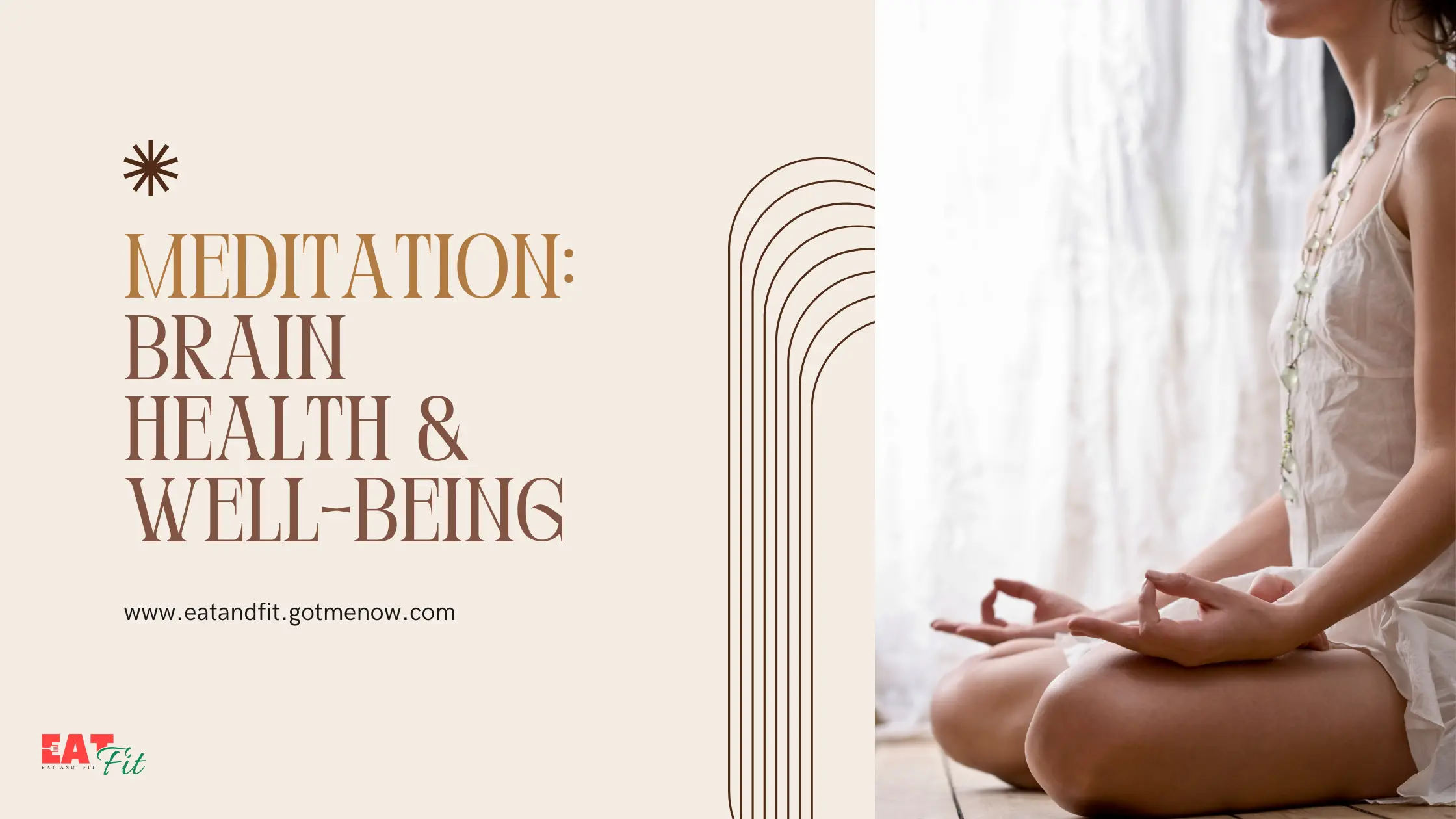- Meditation
- Mental health
- Mental Health Awareness and Coping Strategies
- Understanding and Managing Stress
The Benefits of Meditation for Brain Health and Overall Well-being

Table of Contents
- Introduction
- Restructuring the Physical Brain
- Balance of Neurotransmitters
- Reducing Stress and Inflammation
- Promoting Longevity
- The Practice of Meditation
- Conclusion
- FAQ
Introduction
In today’s blog, I want to discuss the importance of meditation for brain health and overall well-being. Before we dive into the benefits and techniques of meditation, let me provide you with some personal context that highlights why this information is valuable and applicable to everyone.
Throughout my early years, I dedicated my time to studying health and wellness, focusing on topics like nutrition and exercise. While these aspects are crucial for a healthy body, I soon realized that true well-being goes beyond physical fitness. Inner peace and happiness are equally important, and this is where meditation comes in.
My Journey with Meditation: Overcoming Anxiety and Awakening
Meditation, in simple terms, is an awareness practice that involves turning our attention inward. By redirecting our focus from the external world to our own thoughts and feelings, the mind begins to calm down. This calming effect leads to significant changes in brain activity, including shifts in brainwave states.
Now, you may wonder, why should you care about meditation? Well, the purpose of this blog is to shed light on the science-backed benefits of meditation and provide you with practical guidance on how to incorporate this practice into your daily routine. By understanding the positive effects of meditation on the brain and the body, you will be motivated to prioritize this powerful tool for your own well-being.
Restructuring the Physical Brain health
As we age, our brain experiences volume loss and deterioration, leading to memory decline and decreased cognitive function. However, research has shown that meditation can actually halt this brain deterioration.
Multiple studies have demonstrated that regular meditation practice can restructure the physical brain, preventing volume loss and the deterioration of key areas associated with memory, language, and coordination. Research has shown that meditators in their 50s have the brain health and structure of individuals in their 20s.
So, how does meditation achieve this remarkable effect? When we meditate, we turn our attention inward, shifting our focus from the external world to our own thoughts and feelings. This redirection of attention leads to changes in brainwave states, with meditators experiencing calmer and more focused brainwave patterns, such as alpha and even theta waves. These altered brainwave states promote the regrowth of neurons in areas associated with memory, improving memory and reaction time.

But the benefits of meditation go beyond memory and brain health. Regular meditation practice has been shown to have a positive impact on neurotransmitter balance, increasing levels of serotonin, the feel-good neurotransmitter, and GABA, an inhibitory neurotransmitter that promotes calmness and relaxation. This means that meditation can not only improve your mood and overall happiness but also provide a natural way to reduce stress and anxiety without relying on external substances.
In addition, meditation has been found to decrease stress hormones like cortisol and turn off genes associated with inflammation. By reducing inflammation and promoting changes in gene expression, meditation can positively affect overall health and longevity.
So, in summary, the practice of meditation can restructure the physical brain, improve memory and cognitive function, boost happiness and mood, reduce stress, and even influence gene expression for better overall health. It’s like having a natural pharmacy within your own body, releasing chemicals and promoting well-being without relying on external drugs.
If you’re new to meditation, it’s important to remember that it is not religious and can be practiced by anyone, regardless of their beliefs. The most basic form of meditation involves sitting in a straight posture, observing your breath, and being present in the moment. There are also various techniques and apps available to guide you through the meditation process.
By incorporating meditation into your daily routine, you can experience the transformative benefits it offers, both for your brain health and overall well-being. So, why not give it a try and unlock the potential of your own mind?
Balance of Neurotransmitters
Regular meditation practice has been shown to have a positive impact on neurotransmitter balance, specifically increasing levels of serotonin and GABA.
Higher levels of serotonin and GABA in meditators
Research has shown that individuals who regularly meditate have higher levels of serotonin, which is known as the feel-good neurotransmitter. Serotonin plays a crucial role in regulating mood, happiness, and overall well-being. By increasing serotonin levels, meditation can improve mood and promote a sense of happiness and contentment.
In addition to serotonin, meditation has also been found to increase levels of GABA, an inhibitory neurotransmitter that promotes calmness and relaxation. GABA helps to reduce anxiety, stress, and promote a state of tranquility. By increasing GABA levels, meditation can provide a natural way to reduce stress and anxiety without relying on external substances like alcohol.
Comparison to external substances like alcohol
When people consume alcohol, it increases GABA in the brain, leading to a relaxed state. However, the effects of alcohol are temporary and can have negative consequences on both physical and mental health. Meditation, on the other hand, allows individuals to access their body’s internal pharmacy and release these feel-good chemicals naturally, without any negative side effects.
Access to the body’s internal pharmacy through meditation
Meditation provides a unique opportunity to tap into the body’s internal pharmacy and release chemicals that promote well-being. By entering deep meditative states, individuals can experience the release of endorphins, serotonin, GABA, and other feel-good chemicals.
These chemicals not only improve mood and happiness but also have a calming effect on the mind and body. The deep sense of peace and joy experienced during meditation is a result of these chemicals being released and creating a state of profound relaxation.
Release of feel-good chemicals and calming effect
Regular meditation practice allows individuals to experience the release of feel-good chemicals and the calming effect that comes with it. The altered brainwave states achieved during meditation, such as alpha and theta waves, promote the regrowth of neurons in areas associated with memory and improve memory and reaction time.
In addition to the benefits on neurotransmitter balance, meditation also decreases stress hormones like cortisol and turns off genes associated with inflammation, leading to better overall health and longevity.
So, by incorporating meditation into your daily routine, you can tap into your body’s internal pharmacy, release chemicals that promote well-being, and experience the transformative benefits it offers for your brain health and overall well-being.
Reducing Stress and Inflammation
Meditation has been shown to have a profound impact on reducing stress and inflammation in the body, leading to improved overall health and well-being.
Decreased stress hormone cortisol through meditation
Regular meditation practice has been found to decrease the levels of the stress hormone cortisol in the body. Cortisol is released during times of stress and can have detrimental effects on health when levels are chronically elevated. By reducing cortisol levels, meditation helps to promote a state of relaxation and calmness.
Turning off genes associated with inflammation
Research has also shown that meditation can turn off genes associated with inflammation. Chronic inflammation has been linked to numerous health conditions, including heart disease, diabetes, and autoimmune disorders. By reducing inflammation in the body, meditation can help to prevent and manage these conditions.
Positive impact on immune system health
Meditation has a positive impact on immune system health. By reducing stress and inflammation, meditation helps to strengthen the immune system, making it more effective at fighting off infections and diseases.
Long-term health benefits of reduced inflammation
Reducing inflammation through meditation can have long-term health benefits. Chronic inflammation has been linked to aging and the development of age-related diseases. By reducing inflammation, meditation can help to slow down the aging process and promote better overall health and longevity.
Creating a Supportive Workplace: Addressing Mental Health Challenges
Overall, the practice of meditation offers a natural and effective way to reduce stress, and inflammation, and promote better overall health. By incorporating meditation into your daily routine, you can experience these transformative benefits and improve your well-being.
Promoting Longevity
Meditation has been shown to have a profound impact on promoting longevity and improving overall health. Let’s explore some of the specific benefits:
Effects of meditation on genes associated with longevity
Regular meditation practice has been found to increase the activity of an enzyme called telomerase, which helps to extend the length of telomeres. Telomeres are the protective caps at the end of our DNA strands, and as they shorten, it is associated with aging and age-related diseases. By increasing telomerase activity, meditation can help to maintain the length of telomeres and promote longevity.
Increase in telomerase activity and telomere length
In addition to increasing telomerase activity, meditation has also been shown to promote the lengthening of telomeres. Longer telomeres are associated with better overall health and increased life expectancy.
Impact of stress on blood sugar and hypertension
Chronic stress has been linked to imbalances in blood sugar levels and hypertension. Fortunately, meditation can help to reduce stress levels, which in turn can help to regulate blood sugar levels and lower blood pressure. By incorporating meditation into your daily routine, you can effectively manage these conditions and promote better cardiovascular health.
Relaxation and its positive effects on overall health
One of the key benefits of meditation is its ability to induce a deep state of relaxation. When we are in a relaxed state, our body can activate its natural healing mechanisms, reduce inflammation, and improve overall health. By regularly practicing meditation, you can experience the positive effects of relaxation on your physical and mental well-being.

In conclusion, meditation offers a powerful tool for promoting longevity and improving overall health. By meditating regularly, you can positively influence your genes, increase telomerase activity, regulate blood sugar levels and blood pressure, and experience the transformative effects of relaxation. Incorporating meditation into your daily routine can unlock the potential of your own mind and contribute to a long and healthy life.
The Practice of Meditation
Meditation is an awareness practice that involves turning our attention inward. It is not religious and can be practiced by anyone, regardless of their beliefs. In this section, we will address some misconceptions about meditation and religion, highlight the importance of consistent meditation practice, discuss my personal meditation routine and its benefits, and explore different meditation techniques.
Addressing Misconceptions about Meditation and Religion
It is important to clarify that meditation is not connected to any specific religion. It is a practice that focuses on turning inward and calming the mind, regardless of one’s beliefs. Meditation can be seen as a tool for self-discovery and personal growth, rather than a religious or spiritual practice.
Importance of Consistent Meditation Practice
Consistency is key when it comes to meditation. Just like any other habit, regular practice is necessary to experience the full benefits. By incorporating meditation into your daily routine, you can cultivate a sense of inner peace and well-being that extends beyond the meditation session itself. It is during these moments of stillness that the mind can rest and recharge, leading to improved mental clarity, focus, and overall happiness.
Personal Meditation Routine and Its Benefits
Personally, I have found great value in establishing a daily meditation routine. I dedicate time in the morning and evening to sit in a straight posture, observe my breath, and be present in the moment. This practice helps me start my day with a peaceful mindset and unwind before bed. Since incorporating meditation into my routine, I have noticed improved mental clarity, reduced stress levels, and increased overall well-being. It has also helped me become more present and focused in all areas of my life.
Exploration of Different Meditation Techniques
There are various meditation techniques that you can explore to find what works best for you. Some popular techniques include:
- Mindfulness meditation: Focusing on the present moment and observing thoughts and sensations without judgment.
- Loving-kindness meditation: Cultivating feelings of love, compassion, and kindness towards oneself and others.
- Transcendental meditation: Using a mantra or repeated sound to achieve a state of deep relaxation and transcendence.
- Guided visualization meditation: Using visualizations and imagery to create a sense of calm and relaxation.
- Body scan meditation: Bringing attention to different parts of the body, promoting relaxation and awareness.
Exploring different techniques can help you find the one that resonates with you and brings you the most benefit. It is important to remember that meditation is a personal journey, and there is no right or wrong way to do it. The key is to find a technique that allows you to quiet the mind and connect with your inner self.
Incorporating meditation into your daily routine can have profound effects on your brain health and overall well-being. By addressing misconceptions about meditation and religion, emphasizing the importance of consistent practice, sharing my personal meditation routine and its benefits, and exploring different techniques, I hope to inspire you to give meditation a try and experience its transformative effects firsthand.
Conclusion
In conclusion, I encourage everyone to start meditating and experience the numerous benefits it offers for brain health and overall well-being. It is a practice that anyone can incorporate into their daily routine, regardless of their beliefs.
By putting in the effort to meditate consistently, you can restructure your physical brain, prevent volume loss, and improve memory and cognitive function. Meditation also has a positive impact on neurotransmitter balance, increasing levels of serotonin and GABA, which promote happiness and relaxation.
Meditation is a natural way to reduce stress and inflammation in the body. It decreases stress hormones like cortisol and turns off genes associated with inflammation. This leads to better overall health and longevity.
By incorporating meditation into your daily life, you can tap into your body’s internal pharmacy and release chemicals that promote well-being. It allows you to experience a deep sense of peace and joy and improves your mental clarity, focus, and overall happiness.
There are various meditation techniques to explore, such as mindfulness meditation, loving-kindness meditation, transcendental meditation, guided visualization meditation, and body scan meditation. Find the technique that resonates with you and brings you the most benefit.
Remember that consistency is key. Make meditation a habit and prioritize it in your daily routine. By doing so, you can unlock the transformative effects of meditation and enjoy a long and healthy life.
If you have any questions or need guidance on meditation, feel free to reach out to me or my team. We are here to help you on your journey to peace, happiness, and well-being.
FAQ
Here are some frequently asked questions about meditation:
Do I need to follow a specific religion to meditate?
No, meditation is not connected to any specific religion. It is a practice that focuses on turning inward and calming the mind, regardless of one’s beliefs. Meditation can be seen as a tool for self-discovery and personal growth, rather than a religious or spiritual practice.
How often should I meditate?
Consistency is key when it comes to meditation. It is recommended to meditate daily, even if it’s just for a few minutes. By incorporating meditation into your daily routine, you can cultivate a sense of inner peace and well-being that extends beyond the meditation session itself.
Can walking be considered a form of meditation?
Yes, walking can be considered a form of meditation. It is known as a moving meditation. When you walk, you can be present in the moment and focus on the sensations of walking, such as the feeling of your feet touching the ground and the rhythm of your breath. Walking meditation can be a great way to incorporate mindfulness into your daily routine.
Are there any scientific studies on meditation?
Yes, there have been numerous scientific studies on meditation. These studies have shown that regular meditation practice can restructure the physical brain, improve memory and cognitive function, boost neurotransmitter balance, reduce stress hormones and inflammation, and promote overall health and longevity.
How long until I start seeing benefits from meditation?
The benefits of meditation can vary from person to person. Some people may start experiencing benefits, such as increased mental clarity and reduced stress, after just a few sessions. However, it is recommended to practice meditation consistently for a longer period, such as several weeks or months, to fully experience the transformative effects on brain health and overall well-being.









